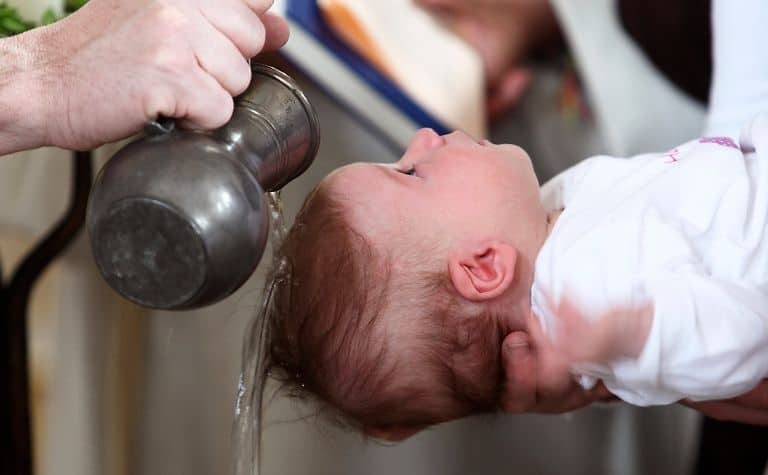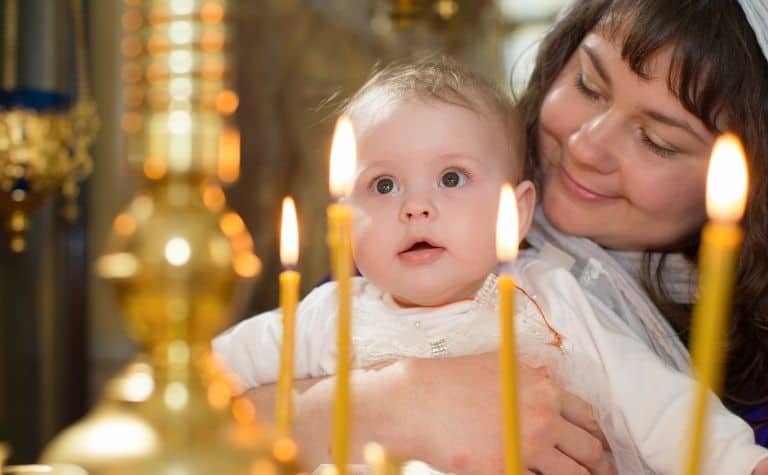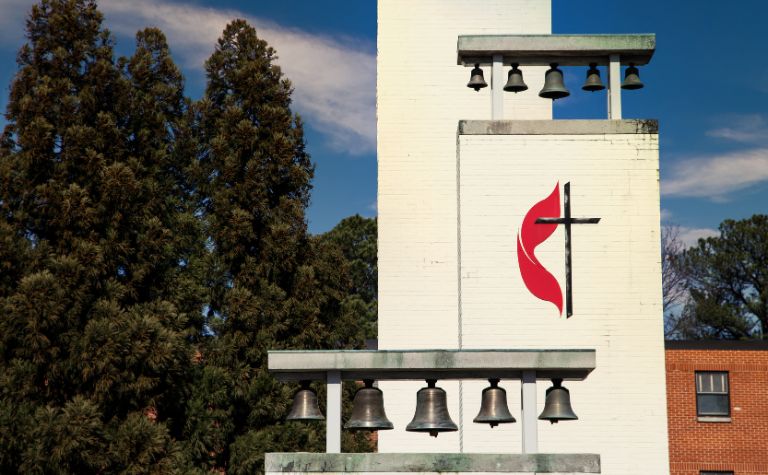Baptism has always been important in the Methodist tradition because of its significance in the New Testament. In addition, baptism is a significant life event for the person getting baptized, their family and friends, and their church community. Therefore, how a person is baptized is also important in Methodism.
Methodists sprinkle or gently pour water over the heads of infants because fully immersing them isn’t safe, as they can’t hold their breath. Thus, like other Protestant traditions, like Presbyterianism, Methodists believe in baptizing infants for blessing and community inclusion.
What is a Methodist understanding of baptism? How does it differ from the Baptist tradition? In what manner and for what purpose do Methodists baptize adults? Keep reading to learn more.

What Happens At a Methodist Baptism?
Methodists believe that baptism is about God initiating a covenant with sinners. Baptized individuals may choose to leave that covenant at some point in their lives, but until they do, they walk down a path toward the holiness of God through Jesus Christ. Baptism essentially starts a person’s relationship with God. (Also Methodist vs. Anglican; What’s the Difference?)
Methodists believe the local church body is vital in supporting the individual’s faith journey in Christ. The United Methodist Church, the largest Methodist denomination in the United States, uses a baptismal liturgy that requires the church congregation to participate throughout the process. Those assembled take vows with parents, sponsors, and the person being baptized (if they aren’t infants).
The process of baptism in Methodism is threefold: (1) what happens in the moments leading up to the baptism, (2) the baptism itself, and (3) what happens in the moments directly after the baptism.
- Before the baptism: Methodists ministers often begin baptisms by explaining the meaning of baptism, according to the New Testament. The minister then asks the person being baptized (if they aren’t an infant) if they have renounced sin and professed faith in Christ.
- The baptism itself: Infant baptism is most common in Methodism, so sprinkling or pouring is most frequent. Adults can be baptized. Most experience sprinkling or pouring, though some ministers may fully immerse someone if requested. When the minister baptizes the individual, the water symbolically cleanses a person of sin, but not in a way that guarantees their salvation. Baptism, in this way of thinking, is not merely symbolic; God uses this public act to minister to the person’s soul.
- After the baptism: When the baptism is over, it’s common for family, friends, and the congregation to applaud and cheer, though this may not be welcome in traditional settings. The minister may speak instructions or encouragement to the child’s parent before praying for the baptized person. Baptism is also a public way for a Christian to be set apart as a follower of Christ. The child, or in some cases, their parents on their behalf, are committing to the Christian faith and practice. [1]
Although Methodists believe that baptism is the ordinary means of justifying grace, it does not guarantee that the person has attained salvation. Methodists also believe that a person can be saved without baptism. (Also see Methodist vs Lutheran: What’s the Difference?)
Does baptism guarantee devotion to Christ?
No. At any point, a baptized person may, verbally or practically, renounce their baptism and walk away from God. This reality is perhaps most obvious in the case of baptized infants, who, when they reach full maturity, may choose to not continue their relationship Christ. In this case, they are removing themselves from the covenant community.

How is Methodist Baptism Different Than Baptist Baptism?
Baptism is partly a public expression of faith in Christ in the Baptist tradition. There is no unique application of grace in immersing a person in the waters of baptism. God, however, commands it, and it serves as a potent symbol of the inward change of the individual.
Do Baptists baptize infants?
No. In the Baptist tradition, baptism results from a person’s willful, conscious decision to follow Christ. An infant cannot have faith; therefore, Baptists believe that a church should not baptize anyone until they mature to an age of accountability. At this point, they can understand the core doctrines of Christianity and believe it for themselves.
Why don’t Baptists baptize infants?
Baptists believe that “believer’s baptism” follows more closely the teaching of the Bible. They argue that in the New Testament, baptism always occurs after an adult has chosen to follow Christ.
Therefore, baptism doesn’t save a person or bestow special grace. Instead, people should be baptized because they have been saved through God’s grace in Christ. Baptism is primarily a symbolic act in the Baptist tradition that testifies to an inward change.
Baptists understand baptism differently than Methodists, yet they still believe it should occur publicly. Once a person is baptized, the church body should hold them accountable to the Christian life that they have identified with. [2] (Also see Do All Denominations Baptize?)
Because baptism should express inward change, Baptists do not believe infant baptism is “baptism” at all. Therefore, if a person was baptized as an infant in a different church tradition, they should be baptized again because their previous baptism did not reflect that person’s decision to follow Christ.
On the other hand, Methodists believe that any Christian baptism that uses Trinitarian theology is valid.
Therefore, Methodists would not advocate for an additional baptism if an individual was baptized in the Catholic Church as a child.
Additionally, Methodists do not think that the Bible exclusively commands the baptism of adults. They would point out passages such as Acts 16:33, which describe the baptism of entire family units. “And he took them the same hour of the night and washed their wounds; and he was baptized at once, he and all his family” (ESV).
This, so the argument goes, would almost certainly include both infants and young children.

How Do Methodists Baptize Adults?
Although Methodists baptize infants, they also baptize adults who convert to Christianity later in life or who, for whatever reason, have never been baptized.
The liturgies that Methodists use for baptism have enough flexibility built into them to work for both the baptism of infants and adults.
For example, during the vow-taking part of the baptism, the minister only leads the individual to take these vows if the person being baptized is of the appropriate age. (Also see Do Catholics Celebrate Lent?)
Because of the emphasis on God’s initiation in baptism and the importance of the covenant community, the baptismal service for infants and adults is much the same.
Regardless of age, at the end of the baptism, the person, at least in the United Methodist Church, automatically becomes a church member. However, only practicing church members are counted for church membership totals and statistics.
Can Methodists be baptized twice?
Occasionally, adults who have already been baptized may wish to be baptized again. This practice is problematic because, traditionally, Methodists have believed that baptism should only happen once. The individual may, however, desire to rededicate their life to Christ publicly. (Also see Do Methodists Believe in the Trinity?)
In response to this request, the UMC has written a church liturgy that shares many similarities to what they use for an actual baptism.
However, instead of sprinkling water on the head, the minister may splash water on the person’s feet. In this way, it remains visually distinct from baptism. [3]
References:
[1] Source
[2] Source
[3] Source
Related Questions
Methodism and Anglicanism are distinct branches of Christianity, though they have a closer relationship to each other than to other denominations and traditions. Because of their unique connection,...
The Methodist and Baptist branches of Protestant Christianity have left indelible marks on the Western world. Not only have the traditions planted churches, but they have positively contributed to...
